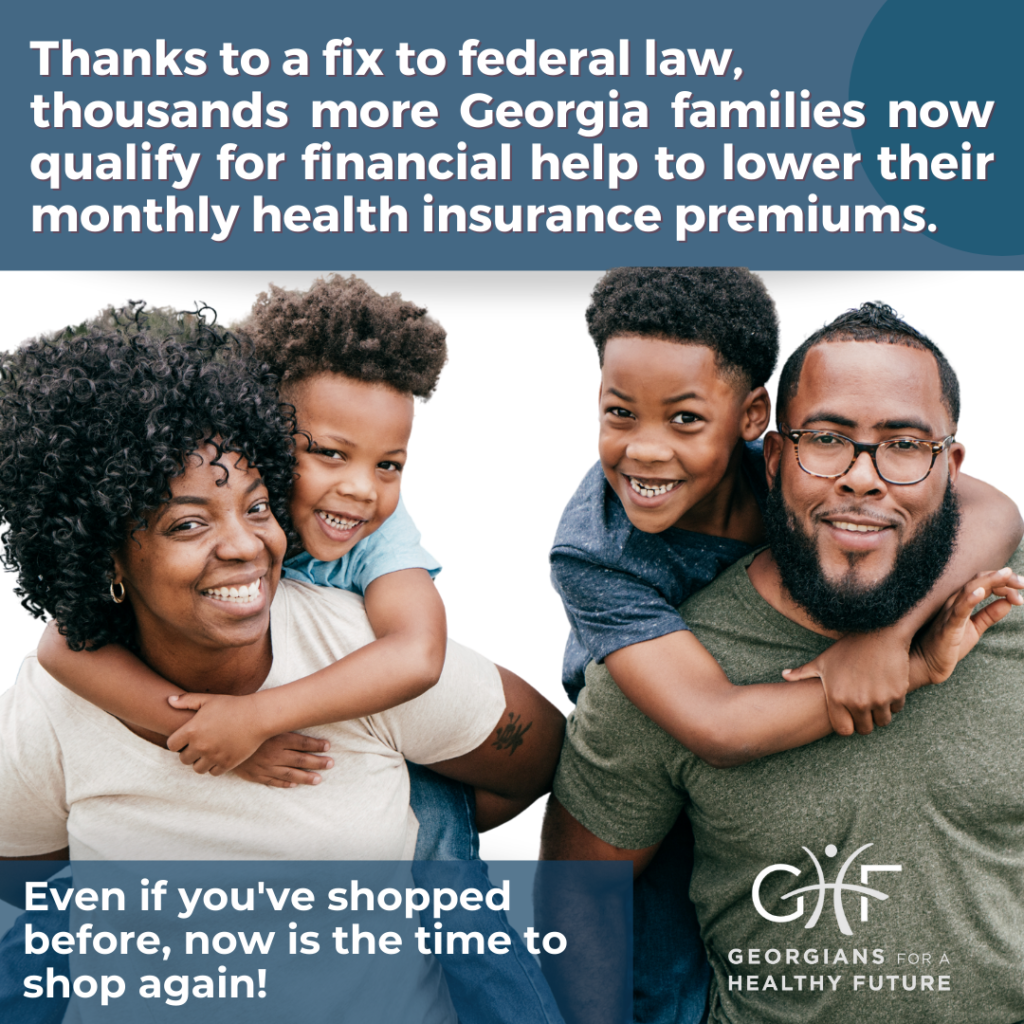Budget bill includes changes to Medicaid similar to Georgia’s ‘Pathways’ program Georgia could soon become the poster child for administering Medicaid with work requirements — for better or worse. As…
Blog ()
- Home
- >
- ACA
Tag: ACA
Millions of Georgians Could Face Big Increases in Health Insurance Costs—Here’s What You Need to Know
If you or someone you know gets health insurance through the Health Insurance Marketplace, you’ve probably noticed it’s been more affordable in recent years. This increase in affordability is thanks to extra financial help from the federal government. These enhanced premium tax credits (ePTCs) make health coverage affordable for working families, self-employed individuals, and people who would otherwise struggle to pay for insurance. But this critical financial help is set to expire at the end of 2025—unless Congress steps in.
If Congress doesn’t extend these tax credits, over 1.2 million Georgians will see huge price increases, and many may be forced to drop their coverage altogether.
(more…)
Every year on November 1st, healthcare.gov and state-specific health insurance marketplaces open so that Americans who don’t have job-based health insurance or other coverage can shop for and enroll in health insurance. In 2024, 1.3 million Georgians enrolled in coverage in this way, and this year their marketplace will look a little different. Here’s what Georgians need to know about the changes.
Since 2013, Georgians have used healthcare.gov to view health insurance plans, qualify for financial help to lower their costs and enroll in the health plan of their choosing. In 2023, Georgia lawmakers moved to change that. The state legislature and Governor Kemp passed a new law that allows Georgia to create its state-based marketplace (SBM). Since then, the Georgia Department of Insurance has been working to create and launch Georgia Access (GeorgiaAccess.gov). Georgia Access launches November 1st.
(more…)As Georgians prepare to cast their votes in this year’s elections, the importance of health care policy has never been clearer. From the future of affordable coverage to the persistent gaps in access for communities around our state, the stakes are high. Georgia’s on-going health challenges highlight the need for candidates who prioritize health and wellness. Georgians need elected leaders who will make decisions that ensure access to affordable, high-quality health care, especially for communities who have historically had more difficult barriers to accessing and affording care.
With this in mind, we’ve developed a set of questions for voters to ask state and local candidates on key health care issues affecting communities around our state. These questions can help guide your conversations with candidates at town halls, forums, or on social media.
(more…)Thanks to a move by the Biden administration, 206,000 more Georgia families will qualify for financial help to purchase health insurance under the Affordable Care Act (also called Obamacare). The “family glitch” has plagued working families whose jobs offer affordable coverage for the worker but not for their family members. With the new federal fix, the family glitch will no longer stand between Georgia’s working families and the affordable health coverage and care they deserve.

Legislative update: Week 8
The GHF team prides itself on delivering timely and accurate updates to you on health care happenings at the Capitol. We hope that you enjoy reading our weekly legislative updates and that they help you stay informed and connected. If you enjoy them, please consider supporting our work with a donation today. Thank you for your continued support!
In this week’s update:

- Action alerts: Ask the House Rules Committee to prioritize mental health & substance use recovery today!
- Bills likely to receive a House or Senate vote today
- Approved last week: Emergency services, prior authorization, & the FY22 big budget
- Advocacy events this week: HIV decriminalization & Medicaid expansion advocacy day!
- U.S. Senate approves COVID-19 relief including extra Medicaid expansion funding for Georgia
- GHF’s got you covered this session!
Legislative Update: Week 7
The GHF team prides itself on being able deliver timely and accurate updates on health care happenings at the Capitol. We hope that you enjoy reading our weekly legislative updates and that they help you stay informed and connected. If you enjoy them, please consider supporting our work with a donation today. Thank you for your continued support!
In this week’s update:

- The General Assembly approves the calendar for the rest of session
- Action alerts: prior authorization, Medicaid expansion, & mental health & substance use updates!
- Legislation: telehealth, changes to nursing rules, & protecting the ACA
- Advocacy events this week: transgender rights!
- Federal COVID-19 relief – including extra Medicaid expansion funding – passed by U.S. House
- GHF’s got you covered this session!
(more…)

Both of Governor Kemp’s health care proposals were approved by federal health officials in the last two weeks. Unfortunately, both proposals fall short of the bold, evidence-based action that Georgians need their state leaders to take. These plans may impact you or people you know. While some details of the plans are still being sorted out, we have tried to answer some of your early questions here. As we learn more and these plans roll out, GHF will keep you updated with the information you need to get covered, stay covered, and help your loved ones do the same.
(more…)Despite repeated claims otherwise, Georgia’s health insurance marketplace has proven to be resilient for consumers in our state. GHF examined the data about Georgia’s 2020 marketplace for our annual Getting Georgia Covered report. We found rising enrollment, lower premiums, and increased choices for consumers. This annual release tells the story of how Georgia individuals and families are faring in the health insurance marketplace. Explore the new interactive digital report to find out more about Georgia’s 2020 marketplace, how it differed from previous years, the Georgians who enrolled and costs of plans, and policy opportunities to increase enrollment, ensure access to care, address affordability, and protect consumers.
Yesterday, the Centers for Medicare & Medicaid Services announced the approval of Georgia’s 1332 State Innovation waiver, title “Georgia Access”. Laura Colbert, Executive Director of Georgians for a Healthy Future has issued the following statement:
“Despite repeated attempts, Governor Kemp’s Georgia Access proposal still fails to explain how a shutdown of the most popular and streamlined health insurance enrollment platform in order to move to a decentralized, privatized enrollment system will address the challenges faced by Georgia consumers, especially those who remain uninsured.
(more…)
Healthcare.gov is open for business from November 1 to December 15, 2020. Georgians can now shop for comprehensive, affordable health plans and enroll in coverage. Nine out of 10 Georgians qualify for financial help to lower their premiums and other costs! Make sure that you are covered in 2021!
Most Georgians who qualify for health insurance & financial help through the Affordable Care Act (also called “Obamacare”) are still uninsured. If you or people you know need more information about how health insurance works, how to enroll in coverage, or what to do after you have signed up, we have you covered! Check out and share these tools so you and your networks can get covered and stay covered:
Stay Connected
Archive
- June 2025
- May 2025
- April 2025
- March 2025
- February 2025
- January 2025
- October 2024
- May 2024
- April 2024
- March 2024
- February 2024
- January 2024
- December 2023
- October 2023
- July 2023
- April 2023
- March 2023
- February 2023
- January 2023
- December 2022
- October 2022
- September 2022
- August 2022
- June 2022
- April 2022
- March 2022
- February 2022
- January 2022
- December 2021
- November 2021
- October 2021
- September 2021
- August 2021
- June 2021
- May 2021
- April 2021
- March 2021
- February 2021
- January 2021
- December 2020
- November 2020
- October 2020
- September 2020
- July 2020
- June 2020
- May 2020
- April 2020
- March 2020
- February 2020
- January 2020
- December 2019
- November 2019
- October 2019
- September 2019
- August 2019
- July 2019
- May 2019
- April 2019
- March 2019
- February 2019
- January 2019
- December 2018
- November 2018
- October 2018
- September 2018
- August 2018
- July 2018
- June 2018
- May 2018
- April 2018
- March 2018
- February 2018
- January 2018
- December 2017
- November 2017
- October 2017
- September 2017
- August 2017
- July 2017
- June 2017
- May 2017
- April 2017
- March 2017
- February 2017
- January 2017
- December 2016
- November 2016
- October 2016
- September 2016
- August 2016
- July 2016
- June 2016
- May 2016
- April 2016
- March 2016
- February 2016
- January 2016
- December 2015
- November 2015
- October 2015
- September 2015
- August 2015
- July 2015
- June 2015
- May 2015
- April 2015
- March 2015
- February 2015
- January 2015
- December 2014
- November 2014
- October 2014
- September 2014
- July 2014
- May 2014
- March 2014
- January 2014
- December 2013
- October 2013
- September 2013
- August 2013
- July 2013
- June 2013
- May 2013
- April 2013
- March 2013
- February 2013
- January 2013
- November 2012
- October 2012
- September 2012
- July 2012
- June 2012
- May 2012
- April 2012
- March 2012
- February 2012
- January 2012
- December 2011
- November 2011
- October 2011
- September 2011
- August 2011
- July 2011
- June 2011
- April 2011
- March 2011
- February 2011
- January 2011
- December 2010
- November 2010
- October 2010
- September 2010
- August 2010
- July 2010
- June 2010
- May 2010
- April 2010
- March 2010
- February 2010
- January 2010
- December 2009
- November 2009
- October 2009

